|
About the speakers
Juan
C. Rey,
Mentor Graphics Corporation
 Juan
C. Rey is the Senior Engineering Director for the Design to Silicon Division
at Mentor Graphics Corporation; his group is responsible for the
architecture, design and development of the Calibre line of products used
for integrated circuits physical verification and tape out tasks such as
design rule checking, layout vs. schematic verification, capacitance,
resistance and inductance extraction, resolution enhancement, mask data
preparation and design for manufacturing. Juan
C. Rey is the Senior Engineering Director for the Design to Silicon Division
at Mentor Graphics Corporation; his group is responsible for the
architecture, design and development of the Calibre line of products used
for integrated circuits physical verification and tape out tasks such as
design rule checking, layout vs. schematic verification, capacitance,
resistance and inductance extraction, resolution enhancement, mask data
preparation and design for manufacturing.
Juan
has 25 years of software development experience ranging from research
activities at Stanford University (EE department), to development and
management (at Technology Modeling Associates, Cadence and Mentor Graphics)
of process and device modeling software. His most recent 15 years have been
in Electronics Design Automation and semiconductor processing modeling.
Srinivas Mandavilli,
Mentor Graphics India
 Dr. Srinivas Mandavilli heads the Hyderabad R&D center of Mentor Graphics India. Mentor Graphics Hyderabad has been in operation for around 10 years and has an employee strength of around 225. Dr. Srinivas Mandavilli heads the Hyderabad R&D center of Mentor Graphics India. Mentor Graphics Hyderabad has been in operation for around 10 years and has an employee strength of around 225.
Prior to joining Mentor Graphics, Srini has served in various engineering and management roles at Ionic Microsystems, Motorola, and Hitachi Semiconductor America.. He holds a Ph.D in Computer Science from the Indian Institute of Science, Bangalore, and a B.Tech in Electronics from Indian Institute of Technology, Madras. For his Ph.D thesis in Genetic Algorithms, Srini received the best Thesis award at IISc in 1993, and had over 10 international publications.
Kazuya
Masu, Tokyo
Institute of Technology
 Kazuya
Masu received the B.E., M.E. and Ph.D. degrees in Electronics Engineering
from Tokyo Institute of Technology, Tokyo, Japan, in 1977, 1979 and 1982,
respectively. He was with the Research Institute of Electrical
Communication, Tohoku University, Sendai, Japan since 1982. In 2000, he
moved to Precision and Intelligence Laboratory, Tokyo Institute of
Technology, Yokohama, Japan and he is currently a professor in Integrated
Research Institute, Tokyo Institute of Technology. He was a visiting
Professor in Georgia Institute of Technology in 2002 and 2005. His current
interests are signal integrity and GHz signal propagation in multilevel
interconnect of Si ULSI, reconfigurable RF circuit technology, LSI
performance evaluation and prediction based on statistical approach, and
BEOL process technology. Kazuya
Masu received the B.E., M.E. and Ph.D. degrees in Electronics Engineering
from Tokyo Institute of Technology, Tokyo, Japan, in 1977, 1979 and 1982,
respectively. He was with the Research Institute of Electrical
Communication, Tohoku University, Sendai, Japan since 1982. In 2000, he
moved to Precision and Intelligence Laboratory, Tokyo Institute of
Technology, Yokohama, Japan and he is currently a professor in Integrated
Research Institute, Tokyo Institute of Technology. He was a visiting
Professor in Georgia Institute of Technology in 2002 and 2005. His current
interests are signal integrity and GHz signal propagation in multilevel
interconnect of Si ULSI, reconfigurable RF circuit technology, LSI
performance evaluation and prediction based on statistical approach, and
BEOL process technology.
He
received IEICE Electronics Society Award in 2005. The paper presented at
A-SSCC2006 (IEEE Asian Solid-State Circuit Conference) has awarded as
Student Design Contest Outstanding Design Award. He served technical
program committee member of international conferences of IEDM (IEEE
International Electron Device Meeting), SSDM (International Conference of
Solid State Devices and Materials), ADMETA (Advanced Metallization
Conference: Japan Session), etc. He is a member of the IEEE, the Japan
Society of Applied Physics (JSAP), the Institute of Electronics, Information
and Communication Engineers (IEICE), the Institute of Electrical Engineers
of Japan (IEEJ), Japan Institute of Electronics Packaging (JIEP), and the
Electrochemical Society (ECS).
Ersed
Ackasu, OEA
International, Inc.
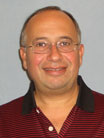 Osman
Ersed Akcasu was born in November 3rd 1955 in Istanbul, Turkey. Graduated
from Technical University of Istanbul in 1977 with BSEE in Electrical
Engineering. In 1980 he received his Ph.D. from University of Bradford,
England in Solid State Electronics. His Ph.D. dissertation was “Two
Dimensional Mathematical Modeling of Bipolar Transistors”. He worked for
Harris Semiconductor, Fairchild Semiconductor, Cray Research and Brooktree
Corporation, all in the areas of Process and Device Physics and
Architecture. Since 1986 his interest was in interconnect related
mathematical modeling. In 1988 he founded OEA International, Inc., which is
primarily focused on interconnect modeling. He has more than 30 technical
articles as first author and several patents. Osman
Ersed Akcasu was born in November 3rd 1955 in Istanbul, Turkey. Graduated
from Technical University of Istanbul in 1977 with BSEE in Electrical
Engineering. In 1980 he received his Ph.D. from University of Bradford,
England in Solid State Electronics. His Ph.D. dissertation was “Two
Dimensional Mathematical Modeling of Bipolar Transistors”. He worked for
Harris Semiconductor, Fairchild Semiconductor, Cray Research and Brooktree
Corporation, all in the areas of Process and Device Physics and
Architecture. Since 1986 his interest was in interconnect related
mathematical modeling. In 1988 he founded OEA International, Inc., which is
primarily focused on interconnect modeling. He has more than 30 technical
articles as first author and several patents.
Noel
Menezes,
Intel Corporation
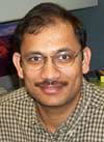 Noel
Menezes manages Intel's Strategic CAD Labs, which is part of the Design and
Technology Solutions division. In the past, he worked on the first
automated interconnect design solution applied to Intel's Pentium 4 family
of microprocessors. His graduate work on clock tree synthesis and the
C-effective delay model for static timing analysis has been applied in the
CAD suites of several EDA vendors and VLSI design companies. His current
research interests are on techniques to analyze and mitigate the impact of
variations in design and advanced cell delay models. Noel holds a B.E.
degree from the Maharaja Sayajirao University, Vadodara, and M.S. and Ph.D.
degrees from the University of Texas at Austin. Noel
Menezes manages Intel's Strategic CAD Labs, which is part of the Design and
Technology Solutions division. In the past, he worked on the first
automated interconnect design solution applied to Intel's Pentium 4 family
of microprocessors. His graduate work on clock tree synthesis and the
C-effective delay model for static timing analysis has been applied in the
CAD suites of several EDA vendors and VLSI design companies. His current
research interests are on techniques to analyze and mitigate the impact of
variations in design and advanced cell delay models. Noel holds a B.E.
degree from the Maharaja Sayajirao University, Vadodara, and M.S. and Ph.D.
degrees from the University of Texas at Austin.
T.W.
Williams,
Sysnopsys
 Dr.
Thomas W. Williams is a Synopsys Fellow at Synopsys in Boulder, Colorado,
U.S.A. Formerly, he was with IBM Microelectronics Division and manager of
the VLSI Design for Testability group. He received a B.S.E.E. from Clarkson
University, an M.A. in pure mathematics from the State University of New
York at Binghamton, and a Ph.D. in electrical engineering from Colorado
State University. He has received numerous best paper awards from the IEEE
and ACM, is the founder or co-founder of a number of workshops and
conferences dealing with testing, and was twice a Distinguished Visitor
lecturer for the IEEE Computer Society. Dr.
Thomas W. Williams is a Synopsys Fellow at Synopsys in Boulder, Colorado,
U.S.A. Formerly, he was with IBM Microelectronics Division and manager of
the VLSI Design for Testability group. He received a B.S.E.E. from Clarkson
University, an M.A. in pure mathematics from the State University of New
York at Binghamton, and a Ph.D. in electrical engineering from Colorado
State University. He has received numerous best paper awards from the IEEE
and ACM, is the founder or co-founder of a number of workshops and
conferences dealing with testing, and was twice a Distinguished Visitor
lecturer for the IEEE Computer Society.
Dr.
Williams has previously served on the Computer Society Board of Governors
and the IEEE Board of Directors, and was the Society’s 2000 Treasurer. He is
a member of the Eta Kappa Nu, Tau Beta Pi, IEEE, ACM, Sigma Xi, and Phi
Kappa Phi. He is an Adjunct Professor at the University of Calgary, Calgary,
Alberta, Canada; and in 1985 and 1997, he was a Guest Professor and Robert
Bosch Fellow at the Universitaet of Hannover, Hannover, Germany. He was
recently named a member of the Chinese Academy of Science. Dr. Williams was
named an IEEE Fellow in 1988 and received the Computer Society’s W. Wallace
McDowell Award for outstanding contributions to the computer art in 1989. In
2007 Dr. Williams received the European Design and Automation Association
Lifetime Achievement Award for “outstanding contributions to the state of
the art in electronic design, automation, and testing of electronic
systems.”
Sachin Sapatnekar,
University of Minnesota
 Sachin
Sapatnekar received the B. Tech. degree from the Indian Institute of
Technology, Bombay in 1987, the M. S. degree from Syracuse University in
1989, and the Ph. D. degree from the University of Illinois at
Urbana-Champaign in 1992. He has worked at Texas Instruments during the
summer of 1990, and at Intel Corporation during the summer of 1997. Sachin
Sapatnekar received the B. Tech. degree from the Indian Institute of
Technology, Bombay in 1987, the M. S. degree from Syracuse University in
1989, and the Ph. D. degree from the University of Illinois at
Urbana-Champaign in 1992. He has worked at Texas Instruments during the
summer of 1990, and at Intel Corporation during the summer of 1997.
He was
an Assistant Professor in the Department of Electrical and Computer
Engineering at Iowa State University from 1992 to 1997. He is currently a
Professor in the Department of Electrical and Computer Engineering at the
University of Minnesota, where he holds the Robert and Marjorie Henle chair.
His current research interests lie in developing efficient techniques for
computer-aided design of integrated circuits, and are primarily centered
around physical design, timing and simulation issues, and optimization
algorithms. He has authored/coauthored/co-edited five books and has served
on the editorial boards of the IEEE Transactions on VLSI Systems (current)
and the IEEE Transactions on CAD (currently as deputy editor-in-chief) and
the IEEE Transactions on Circuits and Systems II: Analog and Digital Signal
Processing (in the past), has served on the Technical Program Committee for
various conferences, including as technical program co-chair for DAC 2006
and 2007. He has been a Distinguished Visitor for the IEEE Computer Society
and a Distinguished Lecturer for the IEEE Circuits and Systems Society, and
is a recipient of the NSF Career Award, the SRC Technical Excellence Award,
and best paper awards at the DAC'97, ICCD'98, DAC'01 and DAC'03 conferences.
He is a Fellow of the IEEE. |
|
Steffen Rochel,
Blaze DFM Inc.,
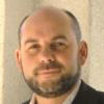 Dr.
Steffen Rochel is the vice president of engineering, Blaze DFM. Dr. Rochel
has over 15 years of development and management experience with successful
startups and established EDA companies such as Anacad, Mentor Graphics,
Simplex Solutions and Cadence. Prior to Blaze, Rochel managed the research
and development teams for a number of product lines and technologies at
Cadence. He joined Cadence by way of the acquisition of Simplex Solutions
where he led the development of the VoltageStorm product line. He has a
Ph.D. and Diploma in Electrical Engineering from the Technical University
Ilmenau in Germany and has co-authored and presented more than 25 conference
papers, journal articles and seminars. Dr.
Steffen Rochel is the vice president of engineering, Blaze DFM. Dr. Rochel
has over 15 years of development and management experience with successful
startups and established EDA companies such as Anacad, Mentor Graphics,
Simplex Solutions and Cadence. Prior to Blaze, Rochel managed the research
and development teams for a number of product lines and technologies at
Cadence. He joined Cadence by way of the acquisition of Simplex Solutions
where he led the development of the VoltageStorm product line. He has a
Ph.D. and Diploma in Electrical Engineering from the Technical University
Ilmenau in Germany and has co-authored and presented more than 25 conference
papers, journal articles and seminars.
Nishath
Verghese,
Cadence Design Systems
 Nishath
Verghese received his BE in Electrical Engineering from BITS, Pilani in
1990, MS and Ph.D in Electrical and Computer Engineering from Carnegie
Mellon University, Pittsburgh in 1995. He was a principal at EDA startups
Apres Technologies and CadMOS Design Technolology, which was acquired by
Cadence Design Systems in April 2001. Nishath
Verghese received his BE in Electrical Engineering from BITS, Pilani in
1990, MS and Ph.D in Electrical and Computer Engineering from Carnegie
Mellon University, Pittsburgh in 1995. He was a principal at EDA startups
Apres Technologies and CadMOS Design Technolology, which was acquired by
Cadence Design Systems in April 2001.
From
2001-2004 he was director of timing and signal integrity products in the
Digital IC division of Cadence. Subsequently, he was VP, R&D for design
products at Clear Shape Technologies, a startup, specializing in model-based
DFM analysis software tools. Since Clear Shape’s acquisition by Cadence in
August 2007, he is serving as group director of electrical DFM and
extraction products at Cadence.
Atul Sharan,
Cadence Design Systems
 Atul Sharan is a 20+ year veteran of the hi-tech industry with experience as an engineer, manager, entrepreneur, senior executive, angel and venture investor. Most recently he was co-founder, President and CEO of Clear Shape Technologies, Inc., which was acquired by Cadence. Prior to Clear Shape, from 1998 to 2003, Mr. Sharan was Senior Vice President, Sales and Marketing for Numerical Technologies, Inc. During his tenure at Numerical, the company grew from pre-revenue stage to a highly successful IPO in April 2000 and was eventually acquired by Synopsys in 2003 where he served as Vice President. Subsequent to that he was resident at Mohr-Davidow Ventures. From 1997 to 1998 Mr. Sharan was in charge of key partnerships and business development at Ambit Design Systems - the company was acquired by Cadence Design Systems in 1998. Atul Sharan is a 20+ year veteran of the hi-tech industry with experience as an engineer, manager, entrepreneur, senior executive, angel and venture investor. Most recently he was co-founder, President and CEO of Clear Shape Technologies, Inc., which was acquired by Cadence. Prior to Clear Shape, from 1998 to 2003, Mr. Sharan was Senior Vice President, Sales and Marketing for Numerical Technologies, Inc. During his tenure at Numerical, the company grew from pre-revenue stage to a highly successful IPO in April 2000 and was eventually acquired by Synopsys in 2003 where he served as Vice President. Subsequent to that he was resident at Mohr-Davidow Ventures. From 1997 to 1998 Mr. Sharan was in charge of key partnerships and business development at Ambit Design Systems - the company was acquired by Cadence Design Systems in 1998.
From 1991 to 1997 Mr. Sharan held senior management positions at Compass Design Automation. While at Compass as General-Manager, India Operations, Mr. Sharan helped establish a software development center in India. From 1984 to 1991, Mr. Sharan worked in semiconductor manufacturing operations at VLSI Technologies and Integrated Device Technology. At IDT Mr. Sharan helped initiate the company's first overseas Test and Assembly plant in Penang, Malaysia. Mr. Sharan has an MBA from University of California, Berkeley, an MS in Engineering from Texas and a B. Tech Degree in Engineering from IIT, India. He is a charter member of TIE.
Nagaraj
N.S., Texas
Instruments Inc., Dallas
 Nagaraj NS is the Director of Interconnect Modeling, Design and Performance Closure at Texas Instruments Inc., Dallas, TX. Over the past 17 years, the design methods and solutions developed by him for signal integrity, interconnect modeling, RC extraction, IR-Drop, reliability, variability and DFM in advanced CMOS technologies have been applied on TI’s DSP and wireless products. Recently, his work includes defining technology for 45nm and 32nm for ASIC, DSP and wireless products. His research, development and application interests include interconnect modeling, variability, DFM and new architectures for digital and analog products. He has served on Technical Program Committees for DAC, CICC, VLSI Design and ISQED. He received B.E. from UVCE, Bangalore University and Ph.D. degrees from University of Texas at Dallas. Nagaraj NS is the Director of Interconnect Modeling, Design and Performance Closure at Texas Instruments Inc., Dallas, TX. Over the past 17 years, the design methods and solutions developed by him for signal integrity, interconnect modeling, RC extraction, IR-Drop, reliability, variability and DFM in advanced CMOS technologies have been applied on TI’s DSP and wireless products. Recently, his work includes defining technology for 45nm and 32nm for ASIC, DSP and wireless products. His research, development and application interests include interconnect modeling, variability, DFM and new architectures for digital and analog products. He has served on Technical Program Committees for DAC, CICC, VLSI Design and ISQED. He received B.E. from UVCE, Bangalore University and Ph.D. degrees from University of Texas at Dallas.
Palkesh Jain, Texas Instruments India
 Palkesh Jain graduated from the Indian Institute of Technology (IIT) Bombay in July 2004, with Bachelors and Masters in Electrical Engineering, under the Dual Degree Programme. His Masters research was on Soft Errors. He joined the Reliability CAD Group at Texas Instruments India in July 2004. Since then, he has contributed to the CAD and methodology development for 65nm and 45nm reliability flows, currently leading the CAD efforts for EM and NBTI. His current research interests are in power-performance-reliability tradeoffs and SoC reliability. Palkesh Jain graduated from the Indian Institute of Technology (IIT) Bombay in July 2004, with Bachelors and Masters in Electrical Engineering, under the Dual Degree Programme. His Masters research was on Soft Errors. He joined the Reliability CAD Group at Texas Instruments India in July 2004. Since then, he has contributed to the CAD and methodology development for 65nm and 45nm reliability flows, currently leading the CAD efforts for EM and NBTI. His current research interests are in power-performance-reliability tradeoffs and SoC reliability.
Gautam Kapila, Texas Instruments India
 Gautam Kapila obtained his B.E degree from NITK, Surathkal and has been with Texas Instruments for 5 years. He has contributed to Antenna, Channel Hot Carriers, Negative Bias Temperature Instability, Gate Oxide Integrity and Electrostatic Discharge CAD solutions. He contributed to FinFET reliability research, as an assignee at IMEC, Belgium. His main interests are in the areas of reliability CAD solutions, device reliability and technology. He is pursuing a Ph.D. degree in 1/f Noise study in advanced MOS devices from IIT Bombay Gautam Kapila obtained his B.E degree from NITK, Surathkal and has been with Texas Instruments for 5 years. He has contributed to Antenna, Channel Hot Carriers, Negative Bias Temperature Instability, Gate Oxide Integrity and Electrostatic Discharge CAD solutions. He contributed to FinFET reliability research, as an assignee at IMEC, Belgium. His main interests are in the areas of reliability CAD solutions, device reliability and technology. He is pursuing a Ph.D. degree in 1/f Noise study in advanced MOS devices from IIT Bombay
Madhav
P. Desai, IIT
Bombay
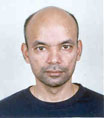 Madhav
P. Desai received the B.Tech. in Electrical engineering from IIT Bombay in
1984, and the M. S. and Ph.D. degrees from the University of Illinois at
Urbana-Champaign. During the period 1992-1996, he worked in the
Semiconductor Engineering Group at the Digital Equipment Corporation in
Hudson, MA, where he was a Principal Engineer. He is currently an Associate
Professor in the Department of Electrical Engineering at IIT Bombay. Dr.
Desai's interests are in the areas of VLSI design and design tools, circuits
and systems, and combinatorial algorithms. His doctoral work involved the
study of the Simulated Annealing algorithm, which is a popular combinatorial
optimization technique. While at Digital, Dr. Desai worked on timing
verification, delay modeling, circuit and interconnect optimization and
contributed to the design of two of the world's fastest CMOS
microprocessors. Madhav
P. Desai received the B.Tech. in Electrical engineering from IIT Bombay in
1984, and the M. S. and Ph.D. degrees from the University of Illinois at
Urbana-Champaign. During the period 1992-1996, he worked in the
Semiconductor Engineering Group at the Digital Equipment Corporation in
Hudson, MA, where he was a Principal Engineer. He is currently an Associate
Professor in the Department of Electrical Engineering at IIT Bombay. Dr.
Desai's interests are in the areas of VLSI design and design tools, circuits
and systems, and combinatorial algorithms. His doctoral work involved the
study of the Simulated Annealing algorithm, which is a popular combinatorial
optimization technique. While at Digital, Dr. Desai worked on timing
verification, delay modeling, circuit and interconnect optimization and
contributed to the design of two of the world's fastest CMOS
microprocessors.
Dr. Desai has been the recipient of GTE and Schlumberger
Graduate Fellowships. He has served as a reviewer for the IEEE Transactions
on Circuits and Systems, the IEEE Transactions on Computers, the SIAM
Journal on Control, and various conferences.
Vani Prasad, Freescale Semiconductor India
 Vani Prasad received her PhD degree from IIT Bombay, India. She has been with Freescale Semiconductor, Bangalore, India since 2006, where she is currently a Design Engineer. Her research interests are interconnect design and optimization, physical design CAD and VLSI circuit design issues. Vani Prasad received her PhD degree from IIT Bombay, India. She has been with Freescale Semiconductor, Bangalore, India since 2006, where she is currently a Design Engineer. Her research interests are interconnect design and optimization, physical design CAD and VLSI circuit design issues.
Vish Sundararaman, Texas Instruments Inc., Dallas
 Dr.
Vish Sundararaman is a Package Engineering Manager at Texas Instruments
Incorporated in Dallas, TX, USA. His core responsibilities include
packaging readiness to support TI’s analog silicon technologies and product
portfolios. During his 8 years with TI, his major roles included
thermo-mechanical modeling and analytical expertise to support advanced
packaging and materials development; he has also made significant
contributions to TI’s advanced CMOS silicon technologies from development
through production. Vish has a B.Tech in Metallurgical Engineering from the
Indian Institute of Technology, an MS in Materials Science and Engineering
from the University of Notre Dame, and a PhD in Mechanical and Aerospace
Engineering from Syracuse University. Vish packaging career began as a
Post-Doctoral Research Fellow at the Georgia Institute of Technology’s
Packaging Research Center. Dr.
Vish Sundararaman is a Package Engineering Manager at Texas Instruments
Incorporated in Dallas, TX, USA. His core responsibilities include
packaging readiness to support TI’s analog silicon technologies and product
portfolios. During his 8 years with TI, his major roles included
thermo-mechanical modeling and analytical expertise to support advanced
packaging and materials development; he has also made significant
contributions to TI’s advanced CMOS silicon technologies from development
through production. Vish has a B.Tech in Metallurgical Engineering from the
Indian Institute of Technology, an MS in Materials Science and Engineering
from the University of Notre Dame, and a PhD in Mechanical and Aerospace
Engineering from Syracuse University. Vish packaging career began as a
Post-Doctoral Research Fellow at the Georgia Institute of Technology’s
Packaging Research Center.
Vidyasagar Ganesan,
AMD
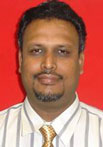 Vidyasagar Ganesan, manages the Soc Design at AMD, India, he has over 14 years experience in the technical management of processor development at Sun Microsystems, Texas Instruments and AMD. Vidyasagar’s interests are in technology, clocking, timing and power distribution. Vidyasagar Ganesan, manages the Soc Design at AMD, India, he has over 14 years experience in the technical management of processor development at Sun Microsystems, Texas Instruments and AMD. Vidyasagar’s interests are in technology, clocking, timing and power distribution.
|
















